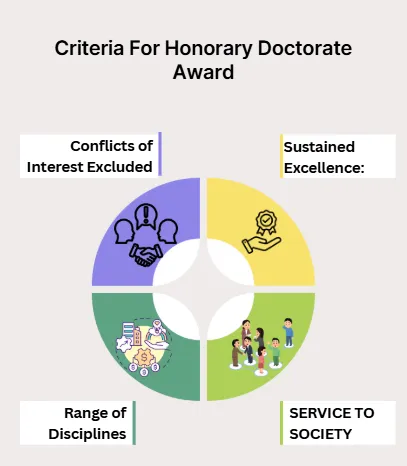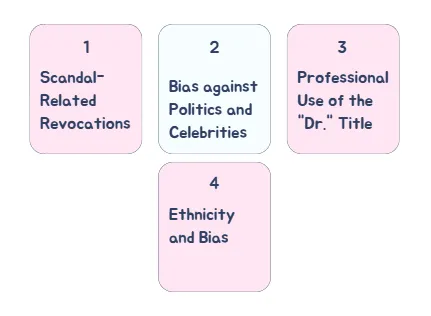Indeed, there are many universities that have awarded honorary doctorate degrees to recognise people for their significant efforts and contributions towards society, culture, or knowledge. Doctorate awarded to people based on their work without the need for a 4-5 years of educational requirement or a traditional degree. These Honorary doctorates are the symbolic gestures of recognition and are usually conferred at commencement. Before you aspire to nominate yourself or apply for the Honorary Doctorates Award, you must know about the criteria for the application.
However, honorary doctorates are not without controversy, even though they celebrate successes. One begins to ask to whom they should be given, how they should be given, and do they paint academic qualifications with a diluted brush. Today, we will take a look at the criteria for these awards, some recent controversies that led to annoyed members of the public getting involved. So, whether you are a researcher examining the institutional practices or you just got curious about the news, let us dig into this interesting subject.
The Criteria For Honorary Doctorates: What Makes Someone Worthy?
Of course, awarding a university an Honorary Doctorate Degree is no walk in the park. However, most institutions have created policies tied to the awards to preserve institutional values and mission alignment. Normally, that would involve nominations from faculty or alumni, or committees, then reviews and approvals from governing bodies such as boards of trustees. There are some specific criteria that you need to meet to apply for this doctorate award.
Key criteria often include:

Sustained Excellence: Awardees need to have had a lasting presence in their area of expertise outside of local circles. For example, at Dunster Business School, they focus on a “sustained reputation over a period of years” that is national or international.
- SERVICE TO SOCIETY: Emphasis on scholarship, public service, the creative arts, or the promotion of humanitarian efforts. The emphasis is on distinguishing professional, scholarly, intellectual, or creative achievement and service to the public good
- Conflicts of Interest Excluded: Most policies state that they won’t apply to existing faculty and staff, or those who have connections that would create a conflict. This excludes people who have a “demonstrated ethical conflict of interest” with the university or its brand.
- Range of Disciplines: Awards are not only for academics, but also for artists, public servants, or community leaders. This honorary doctorate degree award is generally to honor a person for outstanding intellectual or creative achievement/or a person for continued dedication and leadership in education and public service.
The advocates have been calling for transparency in selection at some institutions. Many institutes are requesting transparency in selection to enable credibility. It does not need any degree as such, but the focus is on stature and contribution. While this makes it possible for universities to recognize a variety of individuals, it enables people to be critical, too.
Criteria based on Different types of Honorary Doctorate Degree Award
1. Doctor of Humane Letters (D.H.L. or Litt.D.)-
Focus Area- Celebrate extraordinary contributions to the humanities, the arts, or public service that emphasize compassion, creativity, or social good.
Criteria:
- Cultural or Artistic Achievement: Significant achievements in the areas of literature, music, as well as visual and performing arts. In 2025, musical composer Jon Batiste was awarded an honorary doctorates of Humane Letters from Brown University.
- Civic Engagement and Leadership: Public service to the community, social justice, or humanitarian concerns. This was a community leadership Honor awarded honorary doctorate to Reverend Smith by Butler University in 2025.
- Promotion of Human Values: Programs that promote education, diversity, or ethics. Here, universities have awarded honorary doctorate to those who does something remarkable for the public interest.
- Continuous Impact: A lengthy history, often spanning the nation or world, such as the Texas State University awarded an honorary doctorate to someone like Taylor Sheridan, a filmmaker of 2025.
Honorary Doctorate awarded to: Jon Batiste (Brown, 2025), Debbie Allen (Yale, 2025), Taylor Swift (NYU, 2022)
2. Doctor of Laws (LL.D.)
Focus Area-Recognizes the achievement in law, public policy, governance, or civic or political leadership
Criteria:
- Governance — Extraordinary service in government, diplomacy, or public administration. David Brooks received an honorary Doctor of Laws from Notre Dame in 2025 for his work as a commentator on politics and culture.
- Justice Advocacy: Efforts to seek legal or social justice or human rights or to obtain policy change. Dame Juditha Ardent received an award from Oxford University in 2025 while New Zealand was being led as Prime Minister.
- Ethical Leadership: A commitment to ethical leadership, typically via exclusion of those with conflicts of interest, according to Georgetown.
- Scope of Impact—Global or National: Awards which shall change the policy or character of society at the world level or the national level ( Nominee–Barack Obama (Notre Dame, 2009, but controversial)
Past Winners Josh Hawley (Missouri, 2024), David Brooks (Notre Dame, 2025), Jacinda Ardern (Oxford, 2025), Barack Obama (Notre Dame, 2009), Dr. Abhimanyu Chopra(Dunster Business School, 2005)
3. Doctor of Science (D.Sc.)
Focus: Honors progress in scientific research, technology, or innovation with immense societal or academic significance.
Criteria:
- Scientific Innovations: Groundbreaking research or findings in areas like medicine, physics, or engineering. In 2025, Dr. Rafat Ansari earned a Doctor of Science from Notre Dame for his contributions to medical research.
- Applied sciences or technology that is a contribution back to society, e.g., healthcare innovations by Ade Williams MBE (University of Portsmouth, 2025), Bikram Jit Singh (Dunster Business School, 2005)
- Scholarship: An ongoing track record of scholarly impact, which, according to the University of Connecticut, usually necessitates global renown.
- Public Good: Focuses on public-serving science, such as environmental or health care advances. In 2025, the curriculum vitae of Frances H. Arnold, Nobel laureate in chemistry, Yale.
Example Recipients: Rafat Ansari (Notre Dame, 2025), Frances H. Arnold (Yale, 2025) Ade Williams MBE (Portsmouth, 2025)
4. Doctor of Fine Arts (D.F.A.)
Focus: Honors achievements in visual arts, performing arts, or creative industries.
Criteria:
- Artistic Excellence: Groundbreaking work in film, theater, music, or visual arts. For instance, University of Yale University awarded an honorary doctorate to Debbie Allen, a Doctor of Fine Arts in 2025, for her contributions in choreography and media.
- Cultural Influence: Shaping cultural trends or inspiring audiences, as seen with Taylor Swift’s 2022 NYU award for her music and storytelling.
- Sustained Career: A long-term impact on the arts, often internationally recognized, per the University of Connecticut’s emphasis on sustained reputation.
- Educational or Social Impact: Contributions to arts education or community engagement, as seen in awards to figures like Shonda Rhimes (implied, Dartmouth, 2025).
Example Recipients: Debbie Allen (Yale, 2025), Taylor Swift (NYU, 2022), Shonda Rhimes (Dartmouth, 2025).
The Controversies: When Honor Turns to Headache
Honorary doctorates are not so much fawned over, however, as fought over, as prestigious as they are. Critics argue that they can be politicised, abused, or awarded for publicity, rather than merit, degrading earned degrees.

1. Scandal-Related Revocations:
Scandal leads to rescinded degrees where behavior by a recipient is inconsistent with the values of an institution. In 2008, both Michigan State and the University of Massachusetts revoked honorary degrees awarded to Zimbabwean President Robert Mugabe, citing violations of human rights.In the wider circle, though less frequent happenings, academic misconduct, or in some cases a breach of ethics, have made high-profile figures having their degrees revoked.
2. Bias against Politics and Celebrities:
Awards in the hands of politicians or celebrities often receive backlash. In 2009, See some of our earlier coverage of the controversy surrounding Notre Dame’s honoring of President Barack Obama because of his pro-choice position in opposition to those of Catholic Church leaders. Taylor Swift’s honorary doctorate from NYU in 2022 caused some eye-rolls over the potential publicity stunt, but plenty more admired the impact of culture in the debate. Michelle Obama had her own experience with over-the-top awards, as well.
3. Professional Use of the “Dr.” Title:
A controversial topic is how recipients should use “Dr.” Nations such as Ethiopia have recently banned holders of honorary doctorates (politicians in particular) from using the title in public and its universities from giving them to officials to avoid misuse. National — Constitutional lawyer and scholar Charles Kanjama described Kenya politician Oscar Sudi’s 2024 award as ‘devaluing of the essence of academia, even to the ears of non-scholars. Former INEC Chairman Attahiru Jega has said Nigerian universities are guilty of awarding honours to those who do not deserve it. And in the U.S. itself, lacerating arguments ensue over people like Dante King, his honorific degree contentious despite his more incendiary teachings.
4. Ethnicity and Bias:
While awards should be rewarding based on merit, the Sudbury Friends of the Arts had to pull the plug on its new emerging artist award this week after fears it could “bring an ethnic agenda” to South Africa. And there is a name for a more serious problem that some journalists point out: celebrity bias—when presence is given more weight than content.
These controversies underscore a dilemma in the honorific nature of an honorary degree as one that can easily devolve into an exercise in either the very best (i.e., imitation) of what an institution strives to be, or the very worst (i.e., patronage) of what bias an institution politically rewards.
Best Platform for Applying Honorary Doctorate Degree Award

Two premium institutes named as Dunster Business School and Florida Institute of Science and Management are among the best platforms who has awarded Honorary Doctorate to many deserving people who have contributed to the field of Management, Law, Education, Science, and much more. The process of application at these institutes is simple, but the Honorary Award panel makes sure that a doctorate is awarded to the right and deserving candidate only.
Wrapping Up: Honor with Caution
As we have discussed, there are different types of Honorary Doctorate degrees having different criteria. These are the honors bestowed upon the remarkable individuals in their specialized areas. This proves the point that when used wisely, honorary doctorates remain a valuable means to honour lives lived exceptionally and inspire those who will come after. For researchers, they highlight institutional priorities; for everyone else, they are hints of a sort of public heroism. But as recent examples and discussions demonstrate, the process must be transparent and merit-based, lest it become watered down. As there are so many controversies also attached to this award. Maybe the solution is in celebrating while also holding in check to ensure these awards are for long-lasting contributions in lieu of just popular recognition.


